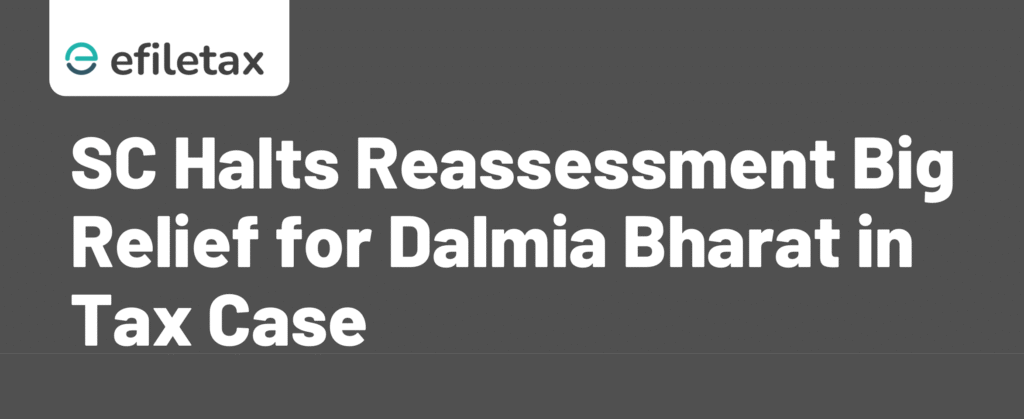
Income Tax Reassessment Stay Supreme Court Relief for Dalmia Bharat
In a significant development, the Supreme Court has granted a stay on reassessment proceedings against Dalmia Bharat Limited, bringing relief to the company amid a wave of Income Tax scrutiny cases post-2021.
This case shines a light on how reassessment powers are being exercised by tax authorities — and the legal remedies available to taxpayers under the Income-tax Act, 1961 and post-amendment Finance Act, 2021.
What is Income Tax Reassessment?
Reassessment is when the Income Tax Department reopens a taxpayer’s case to reassess income, often due to alleged income escaping assessment.
Under Section 147 of the Income-tax Act, the Assessing Officer (AO) can reopen cases within specified timelines, but procedural safeguards must be followed strictly.
Background of the Dalmia Bharat Case
- The tax department issued a notice under Section 148A(b) to Dalmia Bharat Limited.
- The company challenged the reassessment proceedings, citing lack of proper reasons and procedural lapses.
- The Delhi High Court initially declined to stay the proceedings.
- On appeal, the Supreme Court has now granted an interim stay, halting reassessment until further orders.
Legal Basis: Why the Stay Matters
- Section 148A (inserted via Finance Act 2021) mandates prior inquiry before issuing a reassessment notice.
- The SC stay signals strict scrutiny of procedural lapses, especially where AOs bypass safeguards like:
- Failure to provide supporting material
- Not granting reasonable opportunity to reply
- Issuing notices without jurisdiction
What Taxpayers Should Learn from This
| Issue | Compliance Requirement |
|---|---|
| Reopening past assessments | Must have valid “reason to believe” |
| Notice under Sec. 148A(b) | Must include all material facts |
| Response time | Minimum 7 days from notice issuance |
| Order under Sec. 148A(d) | Required before proceeding with reassessment |
| Judicial review | Available via writ petition or appeal |
Expert View: When to Challenge a Reassessment
According to leading tax practitioners, any reassessment notice issued post-01.04.2021 must strictly comply with the Finance Act 2021 procedures.
Taxpayers can and should challenge such notices if:
- No Section 148A(b) opportunity was granted
- Material relied upon was not shared
- Statutory timelines were violated
- Jurisdictional errors exist
🔗 Legal References
- Finance Act, 2021 – Sections 147 to 151
- Supreme Court Interim Stay – Dalmia Bharat Ltd. vs Union of India (May 2025)
- CBDT Instructions on Reassessment (F.No.299/10/2022-Dir(Inv.III), dated 1.8.2022)
Practical Tips for Taxpayers
- Always keep records of past assessments and notices
- Verify the jurisdiction of the AO who issued the notice
- Respond promptly within statutory timelines
- Consult a qualified tax professional or legal counsel
- Use judicial forums (HC/SC) when administrative remedies fail
FAQ
Q1. Can I ignore a reassessment notice?
No. Even if the notice seems invalid, you must respond in writing and take legal steps if required.
Q2. Can reassessment be stayed?
Yes. Courts can grant a stay if procedural lapses or legal violations are evident.
Q3. How far back can the IT department reassess?
Generally up to 3 years from the end of the relevant AY, or up to 10 years in serious cases involving income escaping ₹50 lakh or more.
Final Thoughts
The Supreme Court stay in Dalmia Bharat’s case reinforces that tax authorities must strictly follow the law — especially for reassessment proceedings.
If you’re facing a similar notice, don’t delay.
📞 Let Efiletax help you challenge invalid notices with expert support.
Summary
The Supreme Court granted a stay on reassessment proceedings against Dalmia Bharat Ltd, highlighting procedural lapses under Section 148A of the Income-tax Act. This case reinforces the need for due process post-Finance Act 2021 changes. Taxpayers must verify notice validity and seek expert help for redressal.